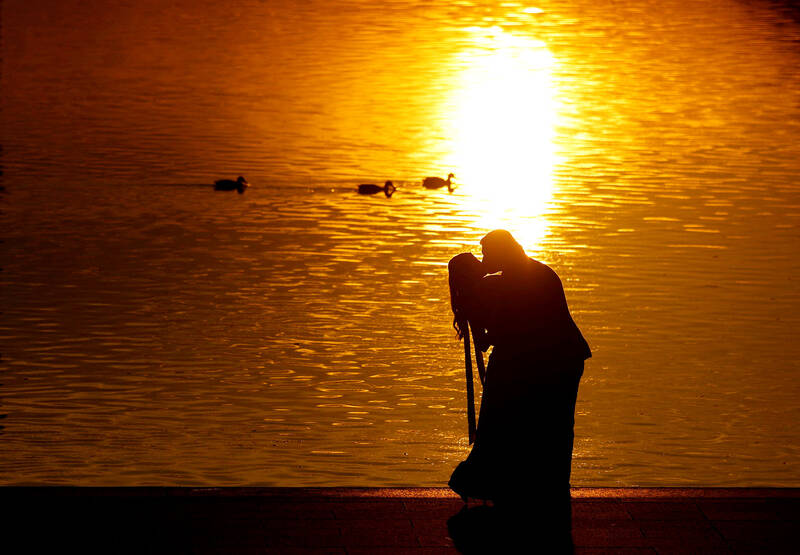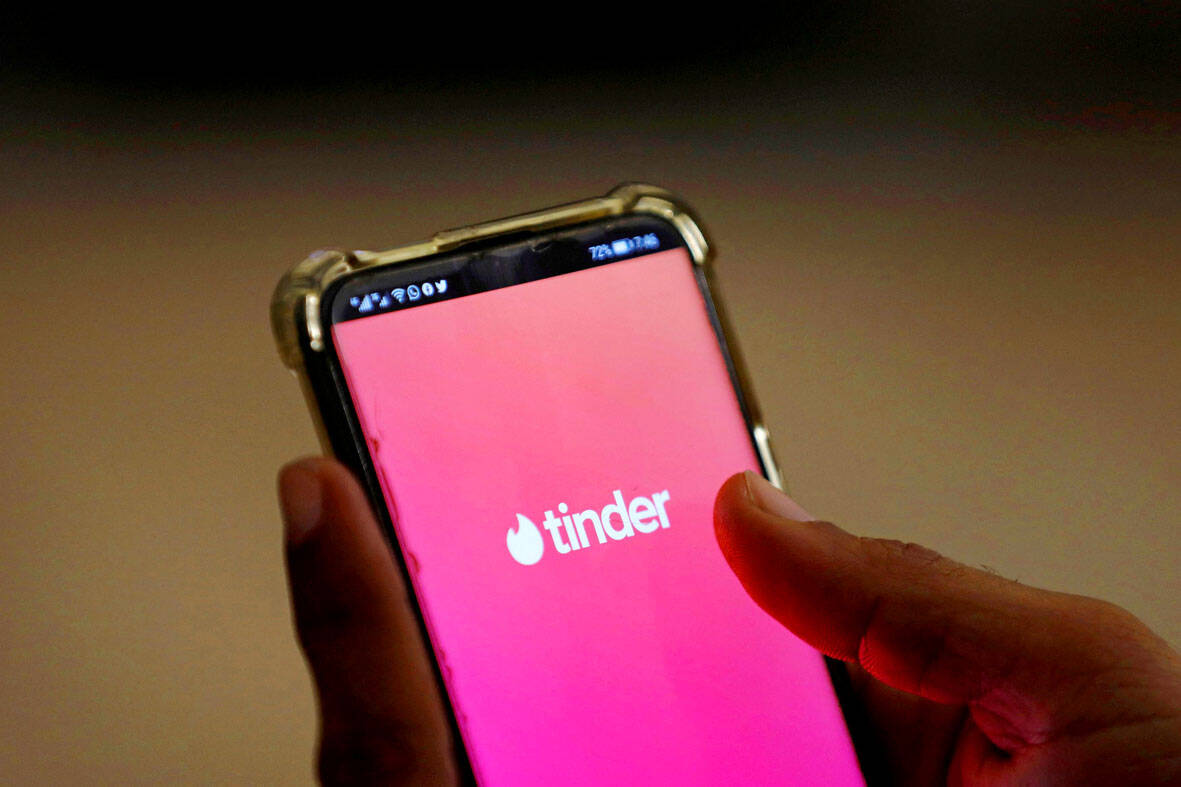Using dating apps to find love is commonplace these days — and yet, for many singles, it has become a double-edged sword. The perks of having a never-ending supply of potential matches at your fingertips are obvious — but the appeal of connecting and meeting with strangers is time-limited. It can be especially frustrating to feel as if you’re stuck at the swiping stage.
In 2023, US jeweler Shane Company found that the average American will spend about eight months using dating apps — swiping on around 3,960 profiles — before finding a partner. But for chronic daters, those numbers will probably sound optimistic; speaking to friends and colleagues, it’s not uncommon to spend years “on the apps” without significant romantic success.
The “download-delete-repeat” cycle can be disheartening and dating-app fatigue is growing; last year’s Online Nation report from Ofcom showed that app use had declined significantly, with a drop of nearly 16 percent in the use of the 10 most popular dating apps. No wonder Meta this week announced that it is bringing an AI assistant to Facebook Dating, as well as Meet Cute, a new “surprise match” feature designed to help users “avoid swipe fatigue.”

Photo: Reuteres
But it doesn’t have to be this way. According to Pew Research Center, around 10 percent of heterosexual people and 24 percent of LGBTQ+ people do meet their long-term partner through a dating site or app — and some seem to do it without dedicating huge amounts of time to fruitless swiping. Is it simply a case of the stars swiftly aligning — or is there a secret to their success?
DELETE THEM
Liz, 28, from Nottingham, downloaded Bumble on a Wednesday and matched with her now-husband the same day. They had their first date on the Friday, and have been together for eight years. Her advice for not getting stuck on the apps? Delete them.

Photo: Reuters
“If you meet someone you have a connection with, delete the apps and give that person your full attention — you aren’t on a dating show!” she says. “After the first date, I knew I really liked him, and I thought: ‘I need to focus on one person at a time.’ You can always go back to the apps later if it doesn’t work out.”
She also found that not everyone she had swiped right on — to indicate that she was interested — would look at the app every day: “So you get this delayed response with matches. I found the constant pings on my phone really distracting — too many people, too many conversations.”
It can be tempting to keep your options open, and speaking to multiple matches is generally deemed acceptable in the early stages of dating. But Liz and her partner deleted Bumble within a week of meeting and found that prioritizing one person was a better way to get to know one another.
NARROW DATING POOL
Another way to avoid the so-called paradox of choice is to intentionally narrow your dating pool. Joseph, 42, from Liverpool, is an advocate for finding your niche: he met his partner after just a couple of months of using vegan and vegetarian dating app Grazer. They got engaged 10 months later, and have now been married for six years. They also have two (vegan) children together.
“It filtered out what I knew I didn’t want,” he says. “It was more just knowing that everyone was on the same wavelength; that took a lot of the stress away. No awkward conversation about being vegan, and no tough arguments in five years’ time about whether we’re going to raise our children vegan or not. There weren’t a lot of people on Grazer, especially in Liverpool, because it was quite new, but it was quality over quantity.”
It’s important to know what you’re looking for, says couples therapist and dating coach Shan Merchant, “whether that’s someone who likes exercise, or enjoys being in nature or likes creativity.” Her advice is to use a mainstream app that has a lot of people signed up, “and also go for more of a specialist app, so you’re not limiting your focus too much.”
Of course, a good way to find someone whose interests and values align with your own is to be completely honest when creating your profile, whichever app you choose.
“My strategy was that I almost wanted to put people off, so that I would only end up meeting with people who were genuinely interested,” says Hannah, 39, from Leeds, who has now been with her partner for seven years. She was on Bumble for around a month before they met, and had been on dates with just two other people from the app.
“I had a theory about being tactical with my photos,” says Hannah. “I wanted them to be reflective of me in real life. My first photo was one where I had my hair done and my makeup on and I thought I looked good, but immediately my second photo was me in the garden, no makeup, just a casual day. Loads of men have all their photos of them doing sport — I don’t have anything against sport, but you sort of think, is that all they do? A lack of variety of photos was definitely something that made me swipe past people — you want to know what the rest of their life looks like.”
While many of the people I spoke to cited the fact that they took dating seriously as the key to their app-based success, Hannah believes that, for her, it was almost the opposite. She’d recently moved back to the north of England after 10 years in London; it was more that she wanted to meet new people and explore the local area.
“I think that mindset made a big difference — I wasn’t going with a checklist,” she says. “It helped me meet someone good.” It’s important, she adds, “to try to ignore preconceptions and be open about who you meet.”
BE PRACTICAL
While theories about how you can “manifest” the perfect partner have gained traction in recent years, Merchant suggests there are other, more practical, ways in which your frame of mind can affect your search for love.
“Keep your energy up and only use apps when you’re feeling good — if you’re feeling tired or stressed, or hungover or low, I wouldn’t recommend going on a dating app, because that’s going to be the filter through which you see people,” she says. “A lot of people struggle to keep a positive attitude when dating — but I think that’s the biggest thing when it comes to dating app success.”
For Nicholas, 69, from Chichester, it was the pandemic that prompted him to be more proactive about dating — something he believes was intrinsic to his positive experience. He connected with his partner within a week of signing up to the now defunct Guardian Soulmates; they’ve been in a relationship for more than five years, living together since February 2022.
“I was apprehensive but knew I had to bite the bullet,” he says. “Have a conversation with yourself as to whether you actually want to make it happen, or whether you want an excuse as to why it hasn’t happened. Show why you would be a good companion. Be willing to go beyond your comfort zone. If you’ve put a profile up, you’ve got to be looking and responding to people.”
Even if not every interaction goes well, “you’re getting practice in how the dynamics work,” Nicholas says. He suggests Romeo, also known as PlanetRomeo, as a good alternative for LGBTQ+ people looking for relationships rather than hookups.
Liz also sees how, for some people, dating apps themselves can become part of the problem, rather than the solution.
“I love my friends dearly, but I’ve watched them on the apps be like: ‘I’ve really enjoyed getting all these Likes but I’m never going to message a single one of them.’ There’s a sense that, because the other person is just a digital image on a screen, their feelings don’t matter.”
If you’re genuinely keen to meet someone, her advice is to remember that profiles are real people: “Don’t mislead anyone, ghost them or stand them up.”
Tinder may have gained a particularly bad reputation for such practices in recent years, but Dan, 45, from the Netherlands, connected with his now-wife about two weeks after installing the app. They’ve been in a relationship for 10 years and have a son together. For him, the key was making sure he stood out.
“I’ve heard people often say I come across as incredibly boring from a distance,” he says. “Suffice to say, I’m never going to seduce anyone with my gorgeous looks or flamboyant style. I’m not rich or influential either. The good thing about dating apps was that they allowed me to immediately start a conversation, which plays to my strong points.”
When messaging someone, he would always try to ask a question or make a joke about something on their profile, to show that he had read it. “It didn’t always work, but sometimes it did.”

The Taipei Times last week reported that the rising share of seniors in the population is reshaping the nation’s housing markets. According to data from the Ministry of the Interior, about 850,000 residences were occupied by elderly people in the first quarter, including 655,000 that housed only one resident. H&B Realty chief researcher Jessica Hsu (徐佳馨), quoted in the article, said that there is rising demand for elderly-friendly housing, including units with elevators, barrier-free layouts and proximity to healthcare services. Hsu and others cited in the article highlighted the changing family residential dynamics, as children no longer live with parents,

It is jarring how differently Taiwan’s politics is portrayed in the international press compared to the local Chinese-language press. Viewed from abroad, Taiwan is seen as a geopolitical hotspot, or “The Most Dangerous Place on Earth,” as the Economist once blazoned across their cover. Meanwhile, tasked with facing down those existential threats, Taiwan’s leaders are dying their hair pink. These include former president Tsai Ing-wen (蔡英文), Vice President Hsiao Bi-khim (蕭美琴) and Kaohsiung Mayor Chen Chi-mai (陳其邁), among others. They are demonstrating what big fans they are of South Korean K-pop sensations Blackpink ahead of their concerts this weekend in Kaohsiung.

Taiwan is one of the world’s greatest per-capita consumers of seafood. Whereas the average human is thought to eat around 20kg of seafood per year, each Taiwanese gets through 27kg to 35kg of ocean delicacies annually, depending on which source you find most credible. Given the ubiquity of dishes like oyster omelet (蚵仔煎) and milkfish soup (虱目魚湯), the higher estimate may well be correct. By global standards, let alone local consumption patterns, I’m not much of a seafood fan. It’s not just a matter of taste, although that’s part of it. What I’ve read about the environmental impact of the

Oct 20 to Oct 26 After a day of fighting, the Japanese Army’s Second Division was resting when a curious delegation of two Scotsmen and 19 Taiwanese approached their camp. It was Oct. 20, 1895, and the troops had reached Taiye Village (太爺庄) in today’s Hunei District (湖內), Kaohsiung, just 10km away from their final target of Tainan. Led by Presbyterian missionaries Thomas Barclay and Duncan Ferguson, the group informed the Japanese that resistance leader Liu Yung-fu (劉永福) had fled to China the previous night, leaving his Black Flag Army fighters behind and the city in chaos. On behalf of the